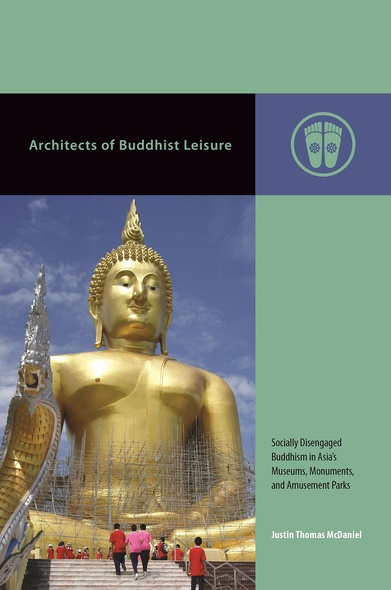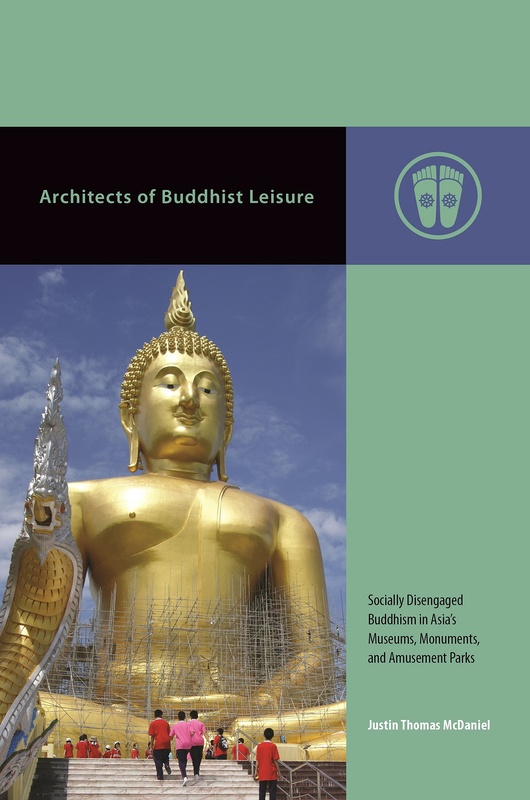
Architects of Buddhist Leisure
Socially Disengaged Buddhism in Asia’s Museums, Monuments, and Amusement Parks
Buddhism, often described as an austere religion that condemns desire, promotes denial, and idealizes the contemplative life, actually has a thriving leisure culture in Asia. Creative religious improvisations designed by Buddhists have been produced both within and outside of monasteries across the region—in Nepal, Japan, Korea, Macau, Hong Kong, Singapore, Laos, Thailand, and Vietnam. Justin McDaniel looks at the growth of Asia’s culture of Buddhist leisure—what he calls “socially disengaged Buddhism”—through a study of architects responsible for monuments, museums, amusement parks, and other sites. In conversation with noted theorists of material and visual culture and anthropologists of art, McDaniel argues that such sites highlight the importance of public, leisure, and spectacle culture from a Buddhist perspective and illustrate how “secular” and “religious,” “public” and “private,” are in many ways false binaries. Moreover, places like Lek Wiriyaphan’s Sanctuary of Truth in Thailand, Suối Tiên Amusement Park in Saigon, and Shi Fa Zhao’s multilevel museum/ritual space/tea house in Singapore reflect a growing Buddhist ecumenism built through repetitive affective encounters instead of didactic sermons and sectarian developments. They present different Buddhist traditions, images, and aesthetic expressions as united but not uniform, collected but not concise: Together they form a gathering, not a movement.
Despite the ingenuity of lay and ordained visionaries like Wiriyaphan and Zhao and their colleagues Kenzo Tange, Chan-soo Park, Tadao Ando, and others discussed in this book, creators of Buddhist leisure sites often face problems along the way. Parks and museums are complex adaptive systems that are changed and influenced by budgets, available materials, local and global economic conditions, and visitors. Architects must often compromise and settle at local optima, and no matter what they intend, their buildings will develop lives of their own. Provocative and theoretically innovative, Architects of Buddhist Leisure asks readers to question the very category of “religious” architecture. It challenges current methodological approaches in religious studies and speaks to a broad audience interested in modern art, architecture, religion, anthropology, and material culture.
Architects of Buddhist Leisure is the first contribution to the new ‘Contemporary Buddhism’ series from the University of Hawai’i Press, and if it is any indication of the quality we can expect from the rest of this series, Buddhist studies scholars should keep an eye out for future offerings. McDaniel has given the field a lot to consider until then.
Justin McDaniel’s new study is an excellent example of the extra-disciplinary methodologies architectural historians can draw on to better understand the diverse material and intellectual exchanges that have shaped the global built environment. . . . It is perhaps because Architects of Buddhist Leisure is not burdened by concerns of orthodoxy or aesthetic success that it allows readers to understand the category of ‘Buddhist architecture’ as something morethan a taxonomy of convenience. The book suggests a combinant set of research methodologiesfor assessing the ways architecture engages with diverse human experiences.
In this enjoyable book, Justin McDaniel once again questions the overemphasis on authenticity in Buddhist studies and opts to look at Buddhism in people’s everyday lives, placing it in local contexts. Architects of Buddhist Leisure will ultimately persuade readers to join McDaniel in asking what makes Buddhism so compelling and to marvel at the far-reaching boundlessness of the question.
Clearly a scholar with very broad interests and an intimate knowledge of Buddhism over a long period, Justin McDaniel has succeeded in narrating the complex story of Buddhist leisure space throughout modern Asia in a way that provokes each of us to reexamine the fleeting and fragmented glances at places we have encountered but haven’t really understood.
Justin Thomas McDaniel is professor of Buddhist studies and chair of the Department of Religious Studies at the University of Pennsylvania.




